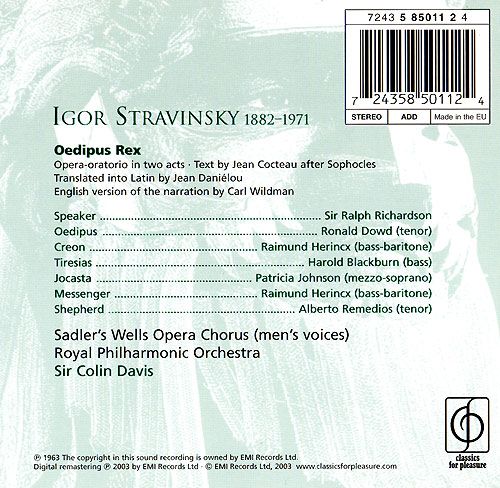wimpel69
11-13-2014, 05:27 PM
EAC-FLAC link below. This is my own rip. Complete artwork,
LOG and CUE files included. Do not share. Buy the original!
Please leave a "Like" or "Thank you" if you enjoyed this!
Oedipus Rex can be seen as a product of many aspects of Igor Stravinsky's development:
his lifelong interest in Greek mythology and drama, his forays into what would come to be identified as
neo-Classicism, and most importantly, his increasing tendency to depersonalize his music, lending it a cool,
almost analytical visage. Oedipus Rex is one of the very first masterpieces of Stravinsky's neo-Classical
period, in which he attempted to invest old forms with new vitality, and it is an impressive and absorbing
musical statement.
Stravinsky's intention was to compose a lengthy, dramatic work, but he could not at first decide what
language to use. He wanted something from the distant past, with an incantory tone that he could exploit
musically. He eventually settled on Latin because, in his words, the language was "not dead but turned to
stone and so monumentalized as to have become immune from all risk of vulgarization." (The libretto
also includes narration which is to be spoken in the language of the audience.) This general theme of
monumentalism extended to Stravinsky's conception of the staging, which involved as little movement
as possible: Entrances and exits would be accomplished with lighting rather than actual movement, the
singers would declaim from elevated platforms and move only their heads and arms, like "living statues,"
and the characters would remain in costumes and masks throughout. Still, Stravinsky identified the work
as an "opera-oratorio" to indicate that it could be performed without staging.
The composer chose the Oedipus myth in large part because he assumed that audiences would be
familiar with it, and this would, therefore, enable him to concentrate on musical dramatization rather than
storytelling. He employed Jean Cocteau to write the libretto in French; after many disputes, drafts and
edits, Stravinsky obtained from the writer a libretto that fit his conception, and gave it to Abbe Jean
Danielou to translate into Latin. Cocteau introduced the idea of the narrator, which Stravinsky accepted
only reluctantly and later regretted; still, it has the benefit of clarifying the story for those who are not
familiar with it.
Oedipus Rex was performed first as an oratorio by Diaghilev's Ballets Russes in 1927, and premiered
as an opera in the following year. The music is mostly in the minor mode; Oedipus' music in particular a
ttempts to achieve the solace of the major mode, but is rarely successful in this regard. While the music
uses elements of basic tonality, these at times seem disconnected from the drama, almost depersonalized;
the C major triad in Creon's aria, sounding weirdly out of place, is an excellent example. Moreover,
Stravinsky in this work abandons the shifting rhythms that characterized much of his earlier music for
a steady, at times insistent pulse. All of these combine to give the listener a vivid musical depiction of an
impersonal Fate pursuing Oedipus until he must give everything up. The effect is at once chilling and
mesmerizing. The general spirit of Stravinsky's interpretation is true to Sophocles' play and to ancient
Greek thought, and the music, paradoxically, involves the listener by its very impersonality.

Music Composed by
Igor Stravinsky
Played by the
Royal Philharmonic Orchestra
With the
Sadler's Wells Opera Chorus
And
Sir Ralph Richardson (narrator)
Ronald Dowd (Oedipus)
Raimund Herincx (Creon)
Harold Blackburn (Tiresias)
Patricia Johnson (Iocasta))
Conducted by
Sir Colin Davis

"Though Colin Davis remains very active as a recording artist, latterly in the brilliant LSO Live series,
it is good to be reminded quite what superb qualities his earliest recordings had. In 1960, as a live-wire
young conductor about to become music director of the Sadler's Wells Opera Company (predecessor
of ENO), he had one of his first really big successes in the theatre - all the more revelatory because it
was totally unexpected.
Directed by Michel St Denis, the production of Stravinsky's Oedipus Rex at Sadler's Wells completely
altered attitudes to what was, at the time, a neglected piece. What had almost universally been
regarded as a dry, over-intellectual work, made all the more arid by the use of a Latin text, was
triumphantly revealed as an overwhelming, vitally dramatic opera, defying convention.
Striking as the stylised staging was, the conducting of Colin Davis was what set the seal on the
experience: shatteringly powerful in its thrust, at once objective and deeply moving in dramatising
Oedipus's tragedy. Record companies moved more slowly in those days, and it was not until the
following year that Davis and his outstanding team from Sadler's Wells went into the EMI recording
studio, with the opera company's own orchestra replaced by the RPO.
A thrilling performance of Stravinsky's score resulted, every bit as powerful as we had heard in the
theatre, yet only now, over 40 years later, has that outstanding recording at last been brought out
of the EMI vaults - one of 12 vintage Sadler's Wells recordings issued this month on CfP. Davis's
electrifying account of Oedipus Rex has a hit-you-between-the-eyes quality reflecting the original
stage experience, with each member of the cast prompted to sing challenging music with heartfelt
commitment. There is no more red-blooded version of the work than this, with Ronald Dowd a
powerful, cleanly focused Oedipus, deeply affecting in his two climactic solos, Invidia Fortunam
Odit and the final, agonised, Lux Facta Est (All Is Revealed).
Patricia Johnson is similarly strong and firm as Jocasta, with a balefully dark chest register.
Raimund Herincx as Creon, Harold Blackburn as Tiresias, and the young Alberto Remedios in the
tiny role of the Shepherd, all bear witness to the vocal and dramatic strengths of the company
at that time. The bonus now is that the disc comes at budget price. The bonus then was that
Stravinsky himself thought so well of the company that within three years he used them for
his own recording of The Rake's Progress."
The Guardian

DOWNLOAD LINK (FLAC) - https://mega.co.nz/#!2YZlGQRb!xDZQEeCyMZtRc29JOIIhhZbdJplxDntQl_V86tU PXzU
Source: EMI Classics, 2003 (my rip!)
Format: FLAC(RAR), ADD Stereo, Level: -5
File Size: 295 MB (incl. artwork & booklet)
Enjoy! Don't share! Buy the origina! Please leave a "Like" or "Thank you" if you enjoyed this! :)
LOG and CUE files included. Do not share. Buy the original!
Please leave a "Like" or "Thank you" if you enjoyed this!
Oedipus Rex can be seen as a product of many aspects of Igor Stravinsky's development:
his lifelong interest in Greek mythology and drama, his forays into what would come to be identified as
neo-Classicism, and most importantly, his increasing tendency to depersonalize his music, lending it a cool,
almost analytical visage. Oedipus Rex is one of the very first masterpieces of Stravinsky's neo-Classical
period, in which he attempted to invest old forms with new vitality, and it is an impressive and absorbing
musical statement.
Stravinsky's intention was to compose a lengthy, dramatic work, but he could not at first decide what
language to use. He wanted something from the distant past, with an incantory tone that he could exploit
musically. He eventually settled on Latin because, in his words, the language was "not dead but turned to
stone and so monumentalized as to have become immune from all risk of vulgarization." (The libretto
also includes narration which is to be spoken in the language of the audience.) This general theme of
monumentalism extended to Stravinsky's conception of the staging, which involved as little movement
as possible: Entrances and exits would be accomplished with lighting rather than actual movement, the
singers would declaim from elevated platforms and move only their heads and arms, like "living statues,"
and the characters would remain in costumes and masks throughout. Still, Stravinsky identified the work
as an "opera-oratorio" to indicate that it could be performed without staging.
The composer chose the Oedipus myth in large part because he assumed that audiences would be
familiar with it, and this would, therefore, enable him to concentrate on musical dramatization rather than
storytelling. He employed Jean Cocteau to write the libretto in French; after many disputes, drafts and
edits, Stravinsky obtained from the writer a libretto that fit his conception, and gave it to Abbe Jean
Danielou to translate into Latin. Cocteau introduced the idea of the narrator, which Stravinsky accepted
only reluctantly and later regretted; still, it has the benefit of clarifying the story for those who are not
familiar with it.
Oedipus Rex was performed first as an oratorio by Diaghilev's Ballets Russes in 1927, and premiered
as an opera in the following year. The music is mostly in the minor mode; Oedipus' music in particular a
ttempts to achieve the solace of the major mode, but is rarely successful in this regard. While the music
uses elements of basic tonality, these at times seem disconnected from the drama, almost depersonalized;
the C major triad in Creon's aria, sounding weirdly out of place, is an excellent example. Moreover,
Stravinsky in this work abandons the shifting rhythms that characterized much of his earlier music for
a steady, at times insistent pulse. All of these combine to give the listener a vivid musical depiction of an
impersonal Fate pursuing Oedipus until he must give everything up. The effect is at once chilling and
mesmerizing. The general spirit of Stravinsky's interpretation is true to Sophocles' play and to ancient
Greek thought, and the music, paradoxically, involves the listener by its very impersonality.

Music Composed by
Igor Stravinsky
Played by the
Royal Philharmonic Orchestra
With the
Sadler's Wells Opera Chorus
And
Sir Ralph Richardson (narrator)
Ronald Dowd (Oedipus)
Raimund Herincx (Creon)
Harold Blackburn (Tiresias)
Patricia Johnson (Iocasta))
Conducted by
Sir Colin Davis

"Though Colin Davis remains very active as a recording artist, latterly in the brilliant LSO Live series,
it is good to be reminded quite what superb qualities his earliest recordings had. In 1960, as a live-wire
young conductor about to become music director of the Sadler's Wells Opera Company (predecessor
of ENO), he had one of his first really big successes in the theatre - all the more revelatory because it
was totally unexpected.
Directed by Michel St Denis, the production of Stravinsky's Oedipus Rex at Sadler's Wells completely
altered attitudes to what was, at the time, a neglected piece. What had almost universally been
regarded as a dry, over-intellectual work, made all the more arid by the use of a Latin text, was
triumphantly revealed as an overwhelming, vitally dramatic opera, defying convention.
Striking as the stylised staging was, the conducting of Colin Davis was what set the seal on the
experience: shatteringly powerful in its thrust, at once objective and deeply moving in dramatising
Oedipus's tragedy. Record companies moved more slowly in those days, and it was not until the
following year that Davis and his outstanding team from Sadler's Wells went into the EMI recording
studio, with the opera company's own orchestra replaced by the RPO.
A thrilling performance of Stravinsky's score resulted, every bit as powerful as we had heard in the
theatre, yet only now, over 40 years later, has that outstanding recording at last been brought out
of the EMI vaults - one of 12 vintage Sadler's Wells recordings issued this month on CfP. Davis's
electrifying account of Oedipus Rex has a hit-you-between-the-eyes quality reflecting the original
stage experience, with each member of the cast prompted to sing challenging music with heartfelt
commitment. There is no more red-blooded version of the work than this, with Ronald Dowd a
powerful, cleanly focused Oedipus, deeply affecting in his two climactic solos, Invidia Fortunam
Odit and the final, agonised, Lux Facta Est (All Is Revealed).
Patricia Johnson is similarly strong and firm as Jocasta, with a balefully dark chest register.
Raimund Herincx as Creon, Harold Blackburn as Tiresias, and the young Alberto Remedios in the
tiny role of the Shepherd, all bear witness to the vocal and dramatic strengths of the company
at that time. The bonus now is that the disc comes at budget price. The bonus then was that
Stravinsky himself thought so well of the company that within three years he used them for
his own recording of The Rake's Progress."
The Guardian

DOWNLOAD LINK (FLAC) - https://mega.co.nz/#!2YZlGQRb!xDZQEeCyMZtRc29JOIIhhZbdJplxDntQl_V86tU PXzU
Source: EMI Classics, 2003 (my rip!)
Format: FLAC(RAR), ADD Stereo, Level: -5
File Size: 295 MB (incl. artwork & booklet)
Enjoy! Don't share! Buy the origina! Please leave a "Like" or "Thank you" if you enjoyed this! :)